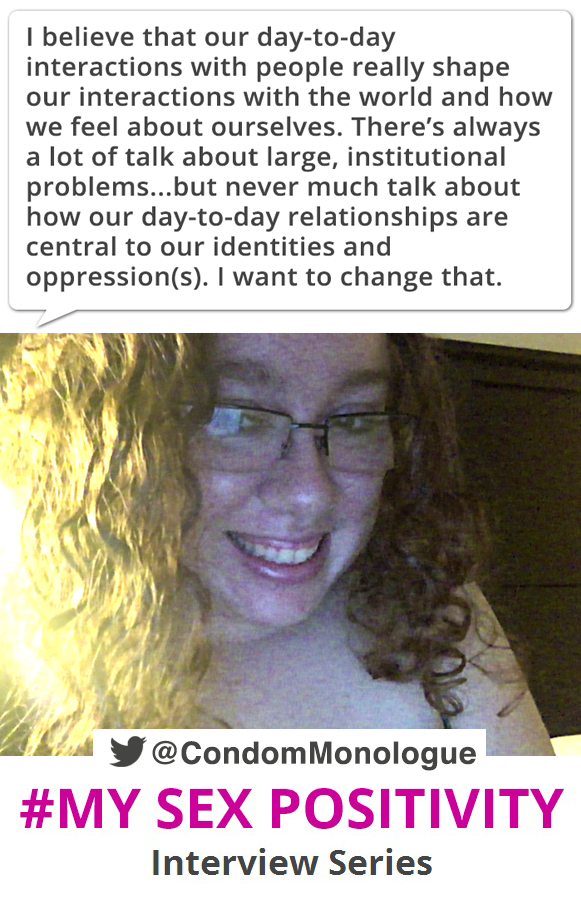For this young e-activist, sex positive is a way of being in the flesh (and in the virtual). While her topics range from slut shame to reproductive health, she is most interested in how sex positivity manifests in our day to day interactions with each other. Through self-reflective vlogging and digital writing, Erin builds a bibliotech of critical feminist self-love. Her prolific writing is sure to inspire.
1) Identify one or two trends, or influential people in the Sex Positive community that you identify with (or are inspired by) and those trends which you relate to not-so-much.
Something I can really identify with is ending victim blaming and slut shaming. We’re all taught to view women as these sexual provocateurs who need to not tempt men with their bodies. Meanwhile the media is objectifying women’s bodies and glorifying the virgin/whore dichotomy. I remember growing up and being really confused by all of this. I was also very in touch with my body and sexuality from a young age; but I was hearing these “sex is bad, and especially bad for women,” messages all around me, which caused a lot of internal conflict. Sex positivity, for me, is to reject these ideas and cause society to question our gendered and sexist views of sexuality. And people are starting to listen. Take for example The UnSlut Project and the recent book Slut! Growing Up Female with a Bad Reputation by Leora Tanenbaum that are now making big waves.
Something I don’t identity with is Kink. I think it’s great that the sex positive community is busting myths and stigma around it, but it’s not something that I personally am interested in!
2) How do you define “sex positivity” for yourself and your work? In other words, what is your primary passion and how do you distinguish your writings and interests from other branches of thought within the sex positive movement?

I define “sex positivity” for myself as a philosophy, a of way of being that is centered on the idea that sexuality is healthy, beautiful and courageous. This has in turn influenced my work- all of my activism, writing, and blogging is rooted in this core principal.
My primary passion is definitely reproductive rights. Without them, there’s no way that feminism could have ever made as much progress for women as it has! There’s also been a constant threat to those rights for the last 50 years, so it’s really important that this issue isn’t seen as already “won”. A recent example of this is the lawsuit that Hobby Lobby has filed to avoid covering contraceptives on their employee’s health care plans, that could result in employers deciding which contraceptives employers have access to, if they choose to offer birth control coverage at all. Another is the recent abortion restrictions that have been legislated throughout 2013 in Texas, Ohio, North Dakota and North Carolina, which beg the question of what right, if any, do we have to ‘choose’ anymore.
I mainly distinguish myself through my feminist spin that comes with all and any analysis that I do. Also, I tend to focus on how the dynamics of relationships work to reinforce patriarchal and oppressive social constructions. I believe that our day-to-day interactions with people really shape our interactions with the world and how we feel about ourselves. There’s always a lot of talk about large, institutional problems, like the lack of access to sex education in schools or the fact that in most States only heterosexual couples can get married, but never much talk about how our day-to-day relationships are central to our identities and oppression(s). I want to change that. My sex positive feminism gives me the critical tools to think through these seemingly “normal” and habitual daily practices.
3) What directions do you think sex positivity will take within the next 5 – 10 years? Or what topics and with what platforms would you like to see sex positivity develop more thoroughly within the next 5 – 10 years?
I think sex positivity will really start to embrace a lot more ideas from queer theory (not that it already doesn’t) and this will define more of the movement. Deconstructing the structures of sexuality that exist throughout society will act as a liberator for everyone and become more mainstream.
I would really like to see sex positivity collaborate with other social movements and make connections between other forms of oppression (like poverty, racism, environmentalism) and how they perpetuate sex-negativity. I think that most social movements are working under very similar philosophies and goals. The more we connect and collaborate, the more power and influence we’ll have.
Opinions shared are the author’s own. Want to participate in this interview series? What is your sex positivity?




Leave a Reply